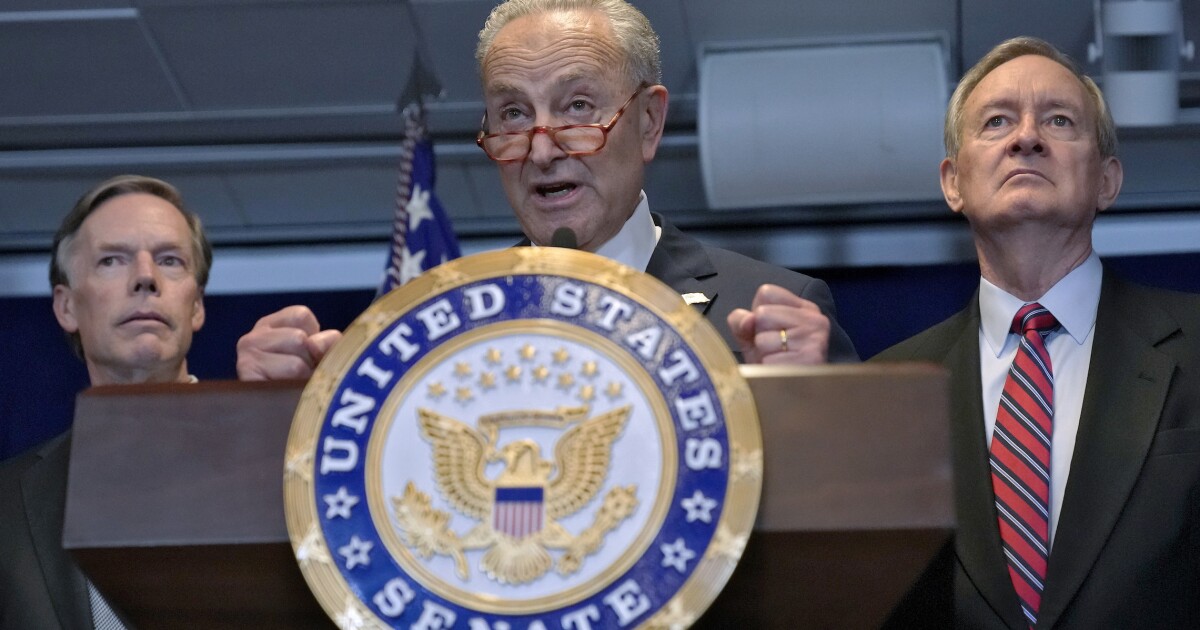

Four days after Hamas terrorists rampaged across southern Israel, Irit Ben-Abba, Israel’s ambassador to China, attended a reception hosted by her American counterpart in Beijing, along with a bipartisan group of U.S. senators visiting China.
“She bore witness to what had happened in Israel,” U.S. Ambassador Nicholas Burns said Thursday evening. “Each of the six senators spoke, and I spoke on behalf of President Biden, and we all said, unequivocally, ‘We’re standing with Israel.’ And I think this makes the United States’s role in the Middle East so important. … We have an irreplaceable role in trying both to defend Israel, oppose terrorism but support peace, eventually, at some point in the future.”
HAMAS TELLS CIVILIANS TO IGNORE ISRAEL’S EVACUATION WARNING
The next day, an Israeli official “expressed Israel’s deep disappointment” with what they deem China’s muted and inadequate response to the Hamas attack.
“There was no clear and unequivocal condemnation of the terrible massacre committed by the terrorist organization Hamas against innocent civilians and the abduction of dozens of them to Gaza,” the Israeli Foreign Ministry said Friday.
The war against Hamas, like the war in Ukraine, looks like it will fit into the sprawling rivalry between Washington and Beijing. President Joe Biden withdrew U.S. forces from Afghanistan in 2021 to prioritize the competition with Russia and China, which aim to orchestrate “a transformation of the … world order,” but that great power competition continues to drive U.S. attention to the Middle East.
“We’re moving closer to a kind of Cold War-style system, where you have China, Russia, and Iran versus the American alliance system,” Hudson Institute senior fellow Michael Doran told the Washington Examiner. “And Israel and the Middle East is caught uncomfortably between the two blocs.”
The alignment of such blocs has been a high priority for officials in the United States, China, and across the Middle East. Iran, long a pariah state with nuclear weapons ambitions, has emerged as a vital source of weaponry for Russia’s protracted war in Ukraine. China, once a bit player in the Middle East, brokered a surprise rapprochement between Iran and Saudi Arabia, which view each other with deep suspicion, and proceeded to boast about burgeoning nuclear cooperation with Riyadh. The Saudi royals, for their part, have signaled their intent to acquire nuclear weapons if Iran gets them first.
Secretary of State Antony Blinken has moved to orchestrate a parallel deal to normalize diplomatic relations between Israel and Saudi Arabia. If finalized, that pact would be underpinned by U.S. security guarantees for Saudi Arabia against Iran and thus also interdict an expansion of Saudi security links to China. Yet Iranian officials are reveling in the thought that the Hamas attack, and Israel’s military response, will inflame anti-Israel sentiment in the Arab world and force Saudi royals to scupper the talks.
“China wants to topple the United States as the leader of the global system and as the world’s foremost strategic actor,” Doran said. “But, primarily, when it comes to undermining the United States in the Middle East, that’s the role of Iran. That’s Iran’s job. And one of the primary tools that Iran has in doing that is Palestinian extremism.”
China’s emergence as an aspiring power broker in the Middle East exposed it to criticism from U.S. and Israeli officials, who have called attention to Beijing’s failure to send any public signal to restrain Iran or its terrorist proxies.
“Our government [has been warning] Iran not to become more involved than it has been in the events in the Middle East,” Burns said at the National Committee on U.S.-China Relations Town Hall on Thursday. “Of course, Iran is an historic supporter of both Hamas and Hezbollah, the creator of Hezbollah. So this kind of real-world, practical diplomacy that the United States has practiced for a long time, you don’t really see the Chinese doing that. So, I think they’re a little bit more distant from these problems than we are.”
Burns evoked that aura of diplomatic expertise one day after a Chinese diplomatic official told the Palestinian Authority, in a conversation that occurred before any reported “public contact” between China and Israel, that Beijing favors “an immediate ceasefire and protection of civilians,” a proposal that irritates Israeli officials determined to “fight [Hamas] until we break their backbone,” as Israeli President Isaac Herzog said Wednesday.
China’s first statement on the terrorist attack came on Saturday and characterized the violence as “an escalation of tensions and violence between Palestine and Israel.” Chinese state media credited Senate Majority Leader Chuck Schumer (D-NY), who led a congressional delegation to Beijing this week, with prompting the foreign ministry to add that “China condemns all violence and attacks on civilians,” without applying any pressure on the terrorists.
“We really hope China can be much more involved in talking to its close partners in the Middle East and particularly Iran,” Ben-Abba, the Israeli ambassador in Beijing, told Bloomberg TV on Thursday. “Iran is definitely very much involved in what has happened.”
Jonathan Schanzer, senior vice president of the Foundation for Defense of Democracies, told the Washington Examiner: “It is a stretch to suggest that all of these fronts are directly connected, but I do see that there is a dotted line connecting all of them … and the strain on the U.S.-led global order is increasingly apparent.”
Noting the international anxiety that Taiwan might also emerge as a hot spot, Schanzer added, “The global order is under strain from multiple conflicts that, at some point, could amount to a world war if world leaders are not careful.”
Russian philosopher Alexander Dugin, a prominent intellectual who has tried to develop a “Eurasian ideology” to animate Putin’s imperial programs, struck an apocalyptic note while suggesting that Russia and “the Islamic world” could present a joint challenge to the West.
“Muslims were not enemies of Ukraine or allies of Russia … but now they may be,” Dugin wrote this week. “Russia represents a pole in a multipolar world. Islam represents a pole in a multipolar world. Both poles stand against the West’s desperate attempts to maintain – even if it risks a world war – unipolarity and global dominance. The Palestinian conflict with Israel was not a civilizational frontline, but now it is.”
Blinken is on a diplomatic tour through the Middle East, a trip that began in Israel and continued through several key Arab states as part of multipronged Western effort to contain the conflict.
“The United States and Qatar share the goal of preventing this conflict from spreading,” he said in Doha following a meeting with Qatari Prime Minister Sheikh Mohammed bin Abdulrahman bin Jassim Al Thani. “We discussed in detail our efforts to prevent any actor, state or nonstate, from creating a new front in this conflict.”
Beyond the Middle East, the maneuverings of China and Russia have provoked strategic reactions, according to Burns.
CLICK HERE TO READ MORE FROM THE WASHINGTON EXAMINER
“China and Russia declared [on] Feb. 4, 2022, a ‘no limits’ partnership. China has paid a heavy price for that, in its support for Russia in the brutal invasion of Ukraine,” Burns said Thursday, referring to the “transformation of the global governance architecture and world order” that Chinese General Secretary Xi Jinping and Russian President Vladimir Putin proposed just weeks before Russia launched the full-scale invasion of Ukraine.
“Countries are flocking to the United States because there’s a fear [of] an axis of Russia and China, perhaps with Iran and North Korea,” Burns said.





